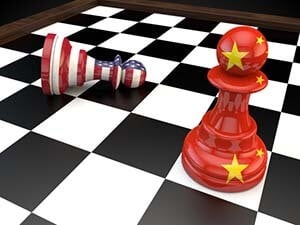China fired a shot heard 'round the world Aug. 11, stoking fears of what could become the ugliest of all currency wars. In a surprise move, the country massively devalued the yuan 2% - its biggest one-day devaluation in 20 years.
Chinese officials were quick to play down the devaluation. Ma Jun, the chief economist at the People's Bank of China, said the Chinese government had "no intention or need to participate in a currency war."
But, as is often the case, actions speak louder than words.
"China is no longer an average player in the global economy. They're the second-largest economy in the world. And when you have the devaluation of 2% right off the bat automatically - you're going to have a higher cost burden on the exports from the United States to Asia, and to one of our largest export markets, to say nothing of the impact it's going to have on the region," Jon Huntsman, former U.S. ambassador to China, told CNN on Aug. 16. "So when you look at the immediate import that it had on currencies - you get a sense as to why people are very, very frustrated with China."
Indeed, the Chinese currency devaluation sent shockwaves through financial markets on Aug. 11...
The Dow Jones Industrial Average plunged 212 points (1.2%) that day. Companies with exposure to China country suffered most, including General Motors Co. (NYSE: GM), which declined more than 3%. The Nasdaq dropped nearly 1.3%, with tech giant Apple Inc. (Nasdaq: AAPL) cratering more than 5%. And the S&P 500 Volatility Index (VIX), the market's fear gauge, surged more than 12% on the day.
China's move will have more than just that immediate impact - it gives the country unprecedented, long-term control over the U.S. dollar...
Currency Wars: China Has U.S. Dollar on Puppet Strings
Peter Schiff, CEO of Euro Pacific Capital and best-selling author of "Crash Proof," issued a warning about currency wars and an impending U.S. dollar collapse. He spoke to Newsmax TV on Aug. 11:
You see, no other country has had this much impact on the U.S. monetary policy in quite some time - or arguably, ever. The U.S. Federal Reserve must now reconsider the dollar's role in foreign exchange markets as it decides whether to raise interest rates this year.
"It is very possible that we could see a 10% to 15% drop in the exchange rate against the U.S. dollar in the next week or two," Duncan Innes-Ker, of the Economist Intelligence Unit, told The Guardian on Aug. 13.
 In an Aug. 13 report, Morgan Stanley analysts Hans Redeker, Ian Stannard, and Sheena Shah said China has exported "deflationary pressure" for global central banks to depress their countries' own exchange rates. "This is not a marginal event, given China's economic weight."
In an Aug. 13 report, Morgan Stanley analysts Hans Redeker, Ian Stannard, and Sheena Shah said China has exported "deflationary pressure" for global central banks to depress their countries' own exchange rates. "This is not a marginal event, given China's economic weight."
The Fed was expected to raise rates as early as next month. It has said it wants to be "reasonably confident" inflation is returning to its 2% target before enacting a rate change.
But a weaker yuan would reduce the price of Chinese goods. That, in turn, would depress the already low U.S. inflation rate of 1.3%.
Currency wars are only one of the ways China aims to take down the U.S. dollar... In fact, there are five dangerous catalysts that could destroy the dollar and trigger a massive U.S. economic collapse. Continue here to find out how these five "flashpoints" will trigger the U.S. dollar demise...
Follow us on Twitter @moneymorning.
Related Articles:


